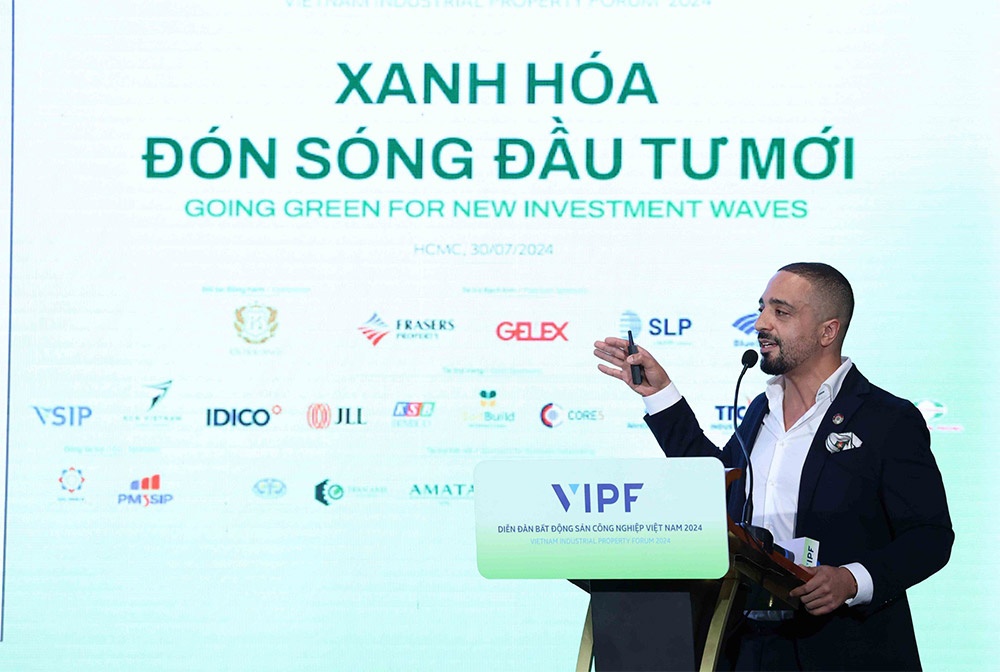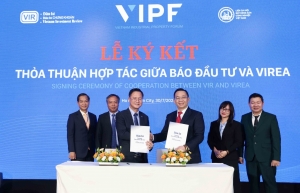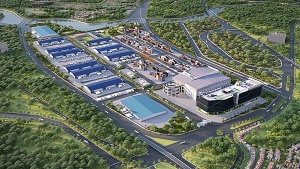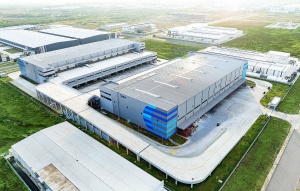Green trends at the fore in industrial real estate sector
Vietnam has explicitly identified green growth as a critical solution for promoting economic restructuring, focusing on growth model innovation, enhanced competitive capacity, and resilience to external shocks. This directly contributes to reducing greenhouse gas emissions towards a carbon-neutral economy in the long run and the goal of limiting global temperature rise.
 |
| Michael Piro, Co-CEO, Indochina Capital |
A significant turning point has been reached, with substantial changes underway. A changing landscape for sustainability is emerging as both public and private involvement increases.
Vietnam has announced the target of reaching net-zero emissions by 2050. Achieving this goal will require more regulations, legal frameworks, and incentives to facilitate the green transition, as the Vietnamese government is introducing policies and legal frameworks to help businesses achieve this target.
Vietnam is now leaning towards the private sector, with over 85 per cent of Vietnam’s 500 fastest-growing companies having made or planning to make environmental, social, and governance commitments. This is very positive, but Vietnam is still behind the global standards. In North America or Europe, these commitments are no longer optional but mandatory for businesses to follow.
Vietnam is taking the right steps with the announcement of direct power purchase agreements. This is a significant move by the Vietnamese government to incorporate green energy into the national grid, allowing the manufacturing real estate sector, a significant electricity consumer, to directly purchase clean energy.
There will be five green trends in the real estate sector in the coming time. Firstly, there will be more projects that be green certified through local and international organisations that provide clear standards such as LEED, Edge, Lotus, and BCA Green Mark. Obtaining these certifications is currently an advantage for businesses, but in the future, it will become a mandatory requirement. Therefore, all industry players should familiarise themselves with these standards and guidelines and start applying them now.
 |
The second trend is that multinationals will prioritise green leases. When looking at Fortune 500 companies leading the charge, almost 70 per cent of them have set net-zero carbon targets, which affects all players in the supply chain. Therefore, they will focus on sustainable buildings and green rental spaces.
Not just Apple, Samsung, and Amazon, but their entire ecosystems and supply chains will be under pressure to adopt and implement sustainable and green practices. They will prioritise buildings, manufacturers, warehouses, and IPs that have undergone green transformations. This is crucial if Vietnam’s industrial real estate sector wants to develop products that engage major tenants.
The third aspect is the rise of the green industrial park. WHA impressed the industry with the implementation of an integrated environmental management system to monitor CO2 emissions and renewable water sources.
For carbon emissions, WHA looks at energy efficiency not just within their IPs but also at the green area ratio in the future. They are tracking these metrics hourly and daily. This is a novelty now but will be a standard in the future.
Deep C Haiphong is also a leader in green energy programmes as they have committed that half of the electricity used in their IPs will come from clean energy sources by 2030. They have utilised rooftop solar business models and wind power, innovating to convert tidal energy into electricity to support their IPs and manufacturing facilities.
The fourth trend is the development of more green ready-built warehouse and factory markets. For example, Core5 and all its IPs have received LEED certification. Core5 has developed sustainable sites focusing on water efficiency, energy and atmosphere, location, and transportation. Their IPs feature bicycle systems for navigating around the park.
Finally, in the rise of green capital and impact investing, capital will begin to prioritise green projects, which impact investments in Vietnam. The majority of Asia-Pacific real estate companies and investment funds aim to achieve net-zero by 2050, according to a CBRE survey. As a result, substantial capital will start to flow into and prioritise green projects.
This is not only about protecting the environment and attracting customers, but also about enabling businesses to secure new green investments. Indochina Capital, for example, currently has eight projects either in operation or under development, with an investment of approximately $500 million.
There are investment funds with millions or even billions of dollars from Asia Green Real Estate and the Green Climate Fund ready to invest in green real estate projects. This presents a tremendous opportunity for all of us to stand out and attract this green capital.
 | VIR and Vietnam Industrial Real Estate Association sign deal Vietnam Investment Review, the press agency under the Ministry of Planning and Investment, and the Vietnam Industrial Real Estate Association signed a cooperation agreement at the Vietnam Industrial Property Forum 2024 in Ho Chi Minh City on July 30. |
 | Green capital flowing into industrial real estate in Vietnam With billions of US dollars poised to invest in green industrial real estate projects, Vietnam has a significant opportunity to stand out and attract these green capital flows. |
 | Navigating challenges in Vietnam's industrial real estate market Vietnam's industrial real estate market boasts ample potential, but challenges remain to its development. |
What the stars mean:
★ Poor ★ ★ Promising ★★★ Good ★★★★ Very good ★★★★★ Exceptional
Related Contents
Latest News
More News
- Sembcorp Development secures licence for VSIP in Khanh Hoa (December 31, 2025 | 18:54)
- Prodezi Long An advances towards integrated eco-centric industrial park model (December 26, 2025 | 11:16)
- Amata to develop $185 million Amata City Phu Tho (December 23, 2025 | 17:49)
- Work starts on Nhat Ban – Haiphong Industrial Zone Phase 2 (December 19, 2025 | 16:43)
- Becamex – Binh Phuoc drives sustainable industrial growth (November 28, 2025 | 15:22)
- South Korean investors seek clarity on IP lease extensions (November 24, 2025 | 17:48)
- CEO shares insights on Phu My 3 IP’s journey to green industrial growth (November 17, 2025 | 11:53)
- Business leaders give their views on ESG compliance in industrial parks (November 15, 2025 | 09:00)
- Industrial parks pivot to sustainable models amid rising ESG demands (November 14, 2025 | 11:00)
- Amata plans industrial park in Ho Chi Minh City (November 04, 2025 | 15:49)

 Tag:
Tag:
















 Mobile Version
Mobile Version